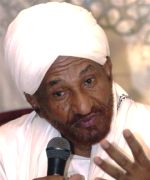Sudanese former PM criticizes constitution, says new govt is not inclusive
By TANALEE SMITH
KHARTOUM, Sudan, July 10, 2005 (AP) — The leader of Sudan’s main opposition party criticized the nation’s interim constitution as deficient on Sunday and said he was forming an alliance with a leading Islamist figure to monitor the new government sworn in the day before.

|
|
Sudanese former prime minister and chairman of the Umma Party, Sadiq al-Mahdi holds a press conference in Khartoum, Sunday, July 10, 2005. (AP). |
Imam Sadiq al-Mahdi, a former prime minister and head of the Umma Party, said he welcomed the power and wealth-sharing rights gained by southern Sudanese in the January peace deal that led to the formation of the new government.
But he objected that the resulting constitution, which was signed into being Saturday, was a bilateral agreement that did not include other groups.
“We think it is a deficient constitution in many ways,” al-Mahdi told reporters at a press conference in a wooden gazebo behind his house.
“The constitution lays a ceiling in terms of participation in power, participation in wealth, and so on. This celling is unacceptable because there are many problems now in the east, in the west and other parts of the Sudan,” he said.
The interim constitution, which followed the swearing in of former southern rebel leader John Garang as first vice president, allocates 52 percent of government and parliament posts to the current ruling National Congress Party, headed by President Omar el-Bashir.
Garang’s Sudan People’s Liberation Movement was given 28 percent of the power, and northern and southern opposition parties take the remaining 20 percent.
“The percentage for our participation and contribution that has been earmarked is infinitesimal and will simply make you take responsibility without power,” al-Mahdi said. “This is something no political force would like to engage in.”
Al-Mahdi believed the present agreement and constitution would lead to the creation of two national leaders, or a “diarchy.”
“All those in the north and the south who are not involved in this diarchy will find themselves together with us in this national front, which will be monitoring the developments in Sudan, particularly in terms of oppression and corruption,” he said.
Al-Mahdi said he was planning to form an opposition alliance with Hasan Turabi, a leading Islamic figure and former el-Bashir strongman who was released from house arrest late June ahead of the new government’s formation.
Turabi, who fell from grace after being accused of power grabbing and dismissed, criticized the constitution before the National Assembly adopted it last week, saying it should have been put to the people in a national referendum. He also called for reconciliation and cooperation between all parties.
Al-Mahdi questioned the international community’s rush to bless the charter and national unity government “without enough homework, without studying the viability and credibility of what they support.”
U.N. Secretary-General Kofi Annan and U.S. Undersecretary of State Robert Zoellick were among the foreign dignitaries who attended Saturday’s signing and inauguration. While praising the huge step forward, both men also urged Sudan’s new government to focus on problems in Darfur and eastern Sudan.
Al-Mahdi acknowledged the charter was a step forward because it defined internationally recognized human rights and was based on the agreement that ended the 21-year southern civil war.
“We are prepared to live with it so long is there is going to be freedom and human rights,” he said, but only until the next legislative elections, which according to the constitution will be held after three years.
Separately, el-Bashir issued a decree that was backed by Garang officially lifting the state of emergency across most of Sudan, except the three troubled Darfur states and two others in the east.
Another decree relieved all government ministers and northern Sudan governors of their responsibilities and asked them to continue as caretakers until el-Bashir and Garang choose a new Cabinet and leadership by Aug. 9.
